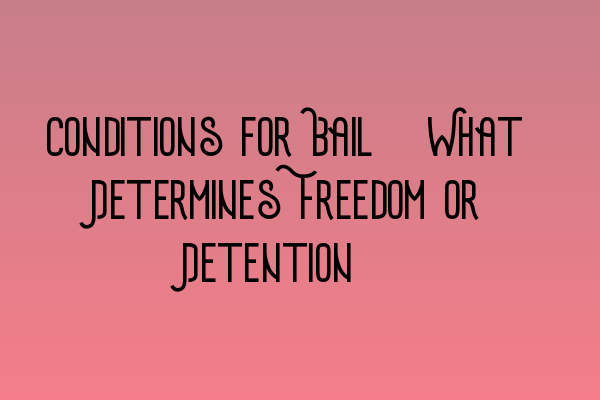Conditions for Bail: What Determines Freedom or Detention?
When someone is arrested and charged with a criminal offense, they may find themselves facing the question of whether they will be granted bail or held in custody until their trial. Bail is the temporary release of a defendant in exchange for a guarantee that they will appear in court as required. The decision to grant bail is not taken lightly and is subject to certain conditions and considerations. In this article, we will explore the factors that determine whether an individual is granted bail or detained.
1. Severity of the Offense
The severity of the offense committed is a critical factor in determining whether bail will be granted. Serious offenses, such as murder or terrorism, may be deemed too risky for a defendant to be released before trial. The court will consider the potential danger the individual may pose to society and the likelihood of them reoffending if released.
If you want to test your knowledge on criminal offenses, you can try out SQE 1 Practice Exam Questions to further understand the complexities associated with criminal law.
2. Flight Risk
An individual’s likelihood of absconding or failing to appear in court is a significant determining factor in granting bail. The court will consider the defendant’s ties to the community, employment status, family responsibilities, and criminal history. If the person has a history of not appearing in court or has a high-risk profile, they are less likely to be granted bail.
3. Public Safety
The safety of the public is of utmost importance in considering whether to grant bail. If the defendant poses a risk to the community or specific individuals, bail may be denied. Factors such as the presence of prior convictions for violent offenses or threats made against potential witnesses can have a significant impact on the court’s decision.
You can learn more about criminal law and how it protects the public by enrolling in SQE 2 Preparation Courses. These courses offer comprehensive insights into criminal procedure and legal practice.
4. Possibility of Interference with the Case
If there is a significant concern that the defendant may attempt to interfere with the case, intimidate witnesses, or tamper with evidence, bail may be denied. The court will explore any allegations of witness intimidation or interference from the defendant’s past behavior.
To enhance your understanding of how the criminal justice system works, it can be beneficial to engage in SQE 1 Practice Mocks FLK1 FLK2. These practice exercises simulate real-life scenarios that criminal lawyers often face.
5. Ability to Comply with Bail Conditions
Bail conditions are typically imposed to ensure that the defendant complies with their release requirements. These conditions may include regular reporting to a police station, surrendering travel documents, or residing at a specific address. If the court determines that the defendant is likely to breach these conditions, bail may be refused.
By familiarizing yourself with the bail conditions, you can better prepare for practicing criminal law. Explore SQE 1 Preparation Courses to gain valuable insights and guidance on professional legal practices.
Conclusion
The decision to grant bail or hold an individual in custody is a complex process that balances the rights of the defendant with public safety concerns. Several factors, such as the severity of the offense, flight risk, public safety considerations, possibility of interference with the case, and ability to comply with bail conditions, are taken into account when making this decision.
If you are considering a career in criminal law, it is essential to familiarize yourself with the intricacies of the legal system and stay up-to-date with SRA SQE Exam Dates to ensure proper preparation for the examinations.
Remember, the determination of bail is a matter for the court to decide based on the specific circumstances of each case. Consulting with an experienced criminal solicitor is crucial to navigate the complexities of the legal system and ensure the best possible outcome for your situation.
